Daily Vocabulary Words: List of Daily Used Words in Leading International Newspapers
Hi there. Welcome to this special section @ Wordpandit.
Our endeavour here is very simple: to highlight important daily vocabulary words, which you would come across in leading newspapers in the country. We have included the following newspapers in our selection:
• The New York Times
• The Washington Post
• Scientific American
• BBC
• The Guardian
• Psychology Today
• Wall Street Journal
• The Economist
We are putting in extensive work for developing your vocabulary. All you have got to do is be regular with this section and check out this post on a daily basis. This is your repository of words that are commonly used and essentially, we are posting a list of daily used words. Hence, this has significant practical application as it teaches you words that are used commonly in leading publications mentioned above.
Visit the website daily to learn words from leading international newspapers.
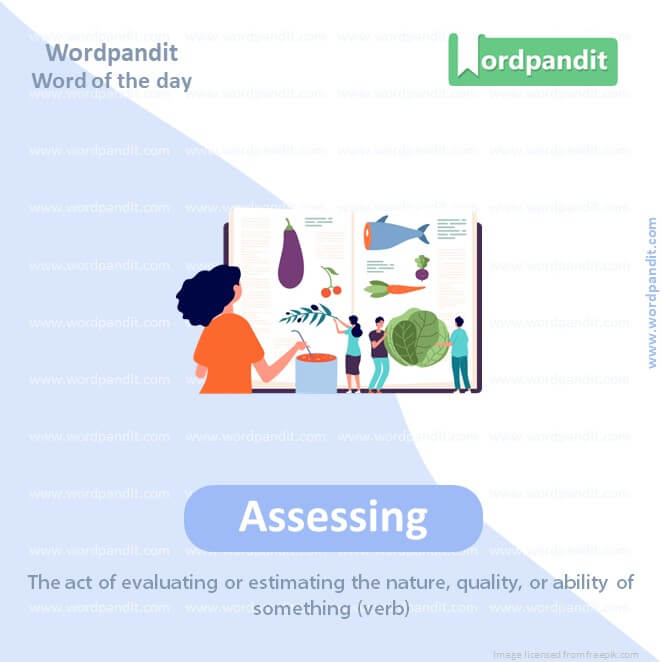
WORD-1: Assessing
CONTEXT: That does not mean we should shrink from honestly assessing performance, including economic performance, under Mr. Trump as well as under Mr. Biden.
SOURCE: New York Times
EXPLANATORY PARAGRAPH: Imagine you have a big box of toys and you want to know how many are inside and what kinds they are. Assessing is like looking carefully at the toys, counting them, and deciding what each one is like. It’s like being a toy detective!
MEANING: The act of evaluating or estimating the nature, quality, or ability of something (verb).
PRONUNCIATION: uh-SES-ing
SYNONYMS: Evaluating, Judging, Analyzing, Examining, Appraising
USAGE EXAMPLES:
1. The teacher was assessing the students’ projects.
2. They spent time assessing the situation before acting.
3. Assessing the damage after the storm took hours.
4. She is skilled at assessing the needs of her clients.
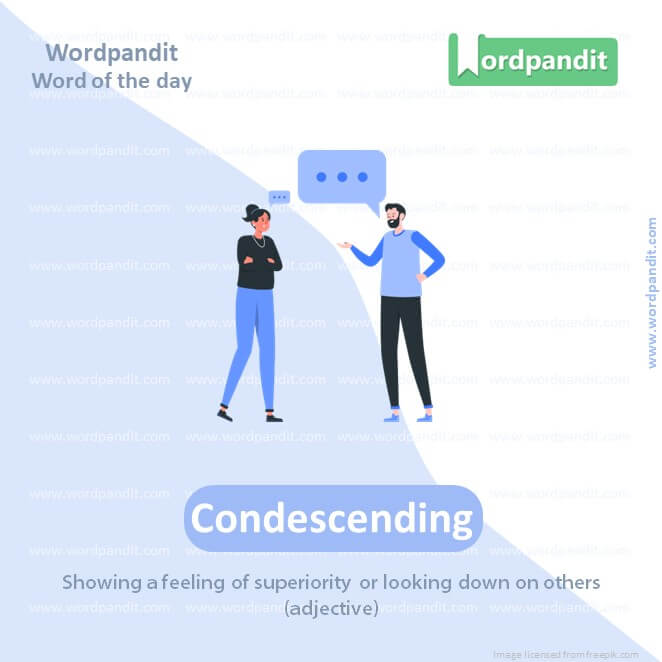
WORD-2: Condescending
CONTEXT: Democrats should have learned by now condescending to Trump voters will not win many of them over.
SOURCE: New York Times
EXPLANATORY PARAGRAPH: Condescending is when someone talks or acts in a way that makes it seem like they think they are better or smarter than others. It’s like a big kid talking to a little kid as if the little kid doesn’t know anything.
MEANING: Showing a feeling of superiority or looking down on others (adjective).
PRONUNCIATION: kon-duh-SEN-ding
SYNONYMS: Patronizing, Disdainful, Snobbish, Superior, Haughty
USAGE EXAMPLES:
1. His condescending tone made her feel uncomfortable.
2. She gave a condescending smile to her younger brother.
3. The teacher’s condescending remarks discouraged the students.
4. He spoke in a condescending way during the meeting.
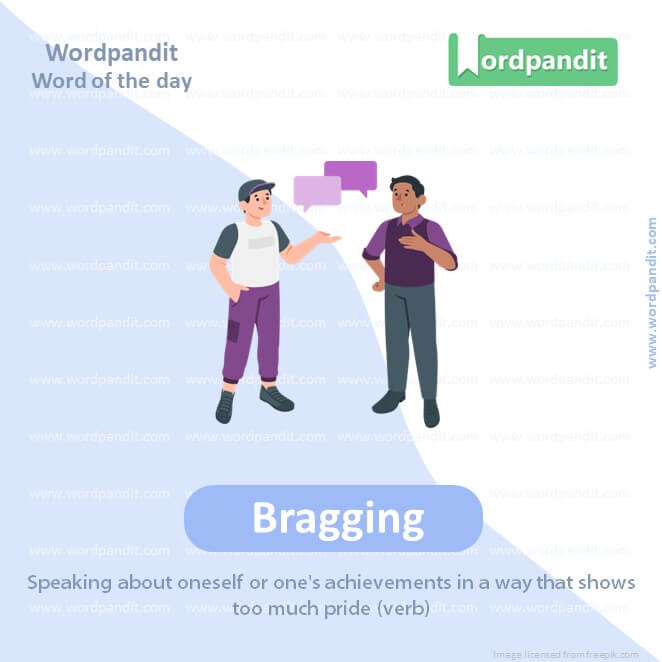
WORD-3: Bragging
CONTEXT: Whenever a candidate boasts, like DeSantis, that he’s visited all 99 counties in Iowa, you hear a shriek of desperation mixed in with the bragging.
SOURCE: New York Times
EXPLANATORY PARAGRAPH: Bragging is like when someone keeps talking about how great they are or the cool things they have done. It’s like showing off to make others think you are very special or better than them.
MEANING: Speaking about oneself or one’s achievements in a way that shows too much pride (verb).
PRONUNCIATION: BRAG-ing
SYNONYMS: Boasting, Showing off, Gloating, Swaggering, Vaunting
USAGE EXAMPLES:
1. He was always bragging about his new bike.
2. She couldn’t stop bragging about her grades.
3. Bragging about your skills can sometimes annoy others.
4. They spent the evening bragging about their vacation.
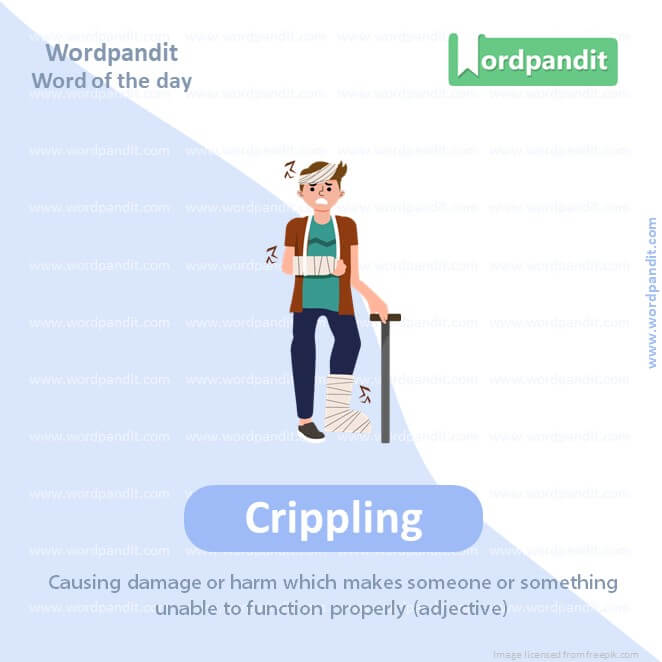
WORD-4: Crippling
CONTEXT: Gonna ask you to give the systems more time to recover from the crippling effects of the pandemic.
SOURCE: New York Times
EXPLANATORY PARAGRAPH: Crippling is like when something is so hurt or damaged that it can’t work properly anymore. Imagine if a toy robot’s leg broke and it couldn’t walk; that’s like crippling.
MEANING: Causing damage or harm which makes someone or something unable to function properly (adjective).
PRONUNCIATION: KRIP-ling
SYNONYMS: Debilitating, Paralyzing, Incapacitating, Damaging, Weakening
USAGE EXAMPLES:
1. The injury had a crippling effect on the athlete’s career.
2. The disease can be crippling if not treated early.
3. They faced crippling debts after the business failed.
4. A crippling fear of heights kept her from climbing the ladder.
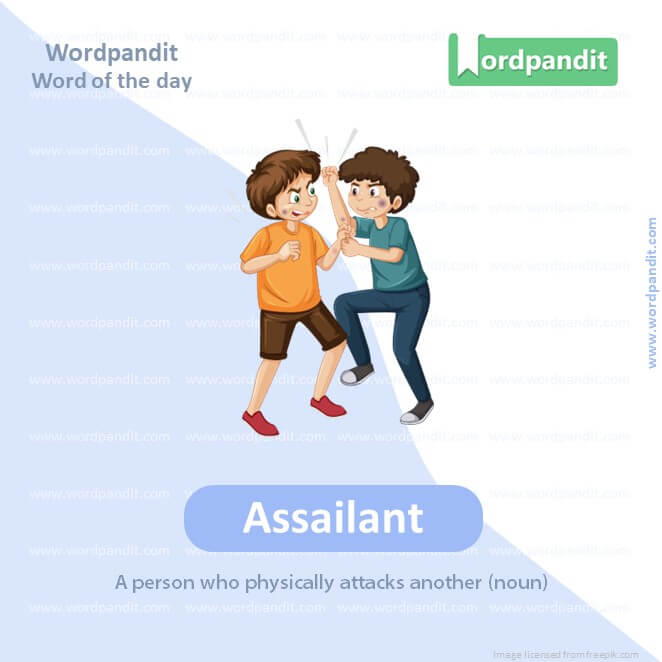
WORD-5: Assailant
CONTEXT: Thanks to the inaction of Republican legislators, there is nothing to stop the next would-be assailant from doing the same thing.
SOURCE: New York Times
EXPLANATORY PARAGRAPH: An assailant is like a person in a story who attacks or hurts someone else. It’s like a villain who tries to harm the hero.
MEANING: A person who physically attacks another (noun).
PRONUNCIATION: uh-SEY-luhnt
SYNONYMS: Attacker, Aggressor, Assaulter, Offender, Invader
USAGE EXAMPLES:
1. The police are searching for the assailant.
2. She bravely fought off her assailant.
3. The identity of the assailant was unknown.
4. Witnesses described the assailant as wearing a red jacket.
WORD-6: Afflicting
CONTEXT: Even whiteness and wealth, which insulate lawmakers from all manner of suffering afflicting their fellow Tennesseans, are no guarantee of safety in a state that’s flooded with guns.
SOURCE: New York Times
EXPLANATORY PARAGRAPH: Afflicting is like when someone feels really bad because something painful or hard to deal with is happening to them. It’s like when you get a bad cold and feel sick and miserable.
MEANING: Causing pain or suffering to; affecting or troubling (verb).
PRONUNCIATION: uh-FLIK-ting
SYNONYMS: Troubling, Tormenting, Burdening, Plaguing, Harassing
USAGE EXAMPLES:
1. The disease was afflicting thousands of people.
2. She was afflicted with a severe headache.
3. Poverty has been afflicting the region for decades.
4. Many were afflicted by the news of the tragedy.
WORD-7: Astonishing
CONTEXT: That rebellious history is forged through its links to social movements, whose victories will seem astonishing, no matter where you’re from.
SOURCE: Guardian
EXPLANATORY PARAGRAPH: Astonishing is like seeing or hearing something so amazing or surprising that it makes you go “Wow!” Imagine seeing a magician pull a rabbit out of a hat when you didn’t expect it at all. That’s astonishing!
MEANING: Extremely surprising or impressive; amazing (adjective).
PRONUNCIATION: uh-STON-i-shing
SYNONYMS: Amazing, Astounding, Staggering, Remarkable, Stupefying
USAGE EXAMPLES:
1. The magician’s tricks were truly astonishing.
2. She achieved astonishing results in her exams.
3. The scenery on the hike was absolutely astonishing.
4. His memory for details was astonishing.
5. They witnessed an astonishing display of skill.
WORD-8: Enshrined
CONTEXT: Dr. Metzl has become convinced that long-enshrined arguments for gun safety must be reconsidered and recast to move beyond traditional side taking.
SOURCE: New York Times
EXPLANATORY PARAGRAPH: Enshrined is like putting something really special in a safe place where everyone can see it and remember it. It’s like keeping a trophy in a glass box.
MEANING: To preserve or cherish something as sacred (verb).
PRONUNCIATION: en-SHRINED
SYNONYMS: Preserved, Protected, Cherished, Immortalized, Sanctified
USAGE EXAMPLES:
1. The constitution enshrines the rights of citizens.
2. His medals were enshrined in a display case.
3. The tradition is enshrined in the community’s culture.
4. Her memory is enshrined in the hearts of her family.
WORD-9: Indefatigable
CONTEXT: The indefatigable parents of Covenant might be able to convince them. Learning from earlier survivor efforts, joining the work of gun-reform advocates on the other side of the aisle, and speaking with the survivor’s voice of moral authority, they are perfectly positioned to break through the polarities of even red-state politics.
SOURCE: New York Times
EXPLANATORY PARAGRAPH: Indefatigable is like having so much energy that you never get tired. Imagine a superhero who can keep going and doing their super stuff all day without needing a break.
MEANING: Incapable of being tired out; not yielding to fatigue (adjective).
PRONUNCIATION: in-duh-FAT-i-guh-buhl
SYNONYMS: Tireless, Unflagging, Unwearied, Unrelenting, Persistent
USAGE EXAMPLES:
1. She was known for her indefatigable spirit.
2. His indefatigable efforts led to the project’s success.
3. The indefatigable teacher inspired her students.
4. They worked indefatigably to complete the task on time.
WORD-10: Obstreperous
CONTEXT: You can see that they’re a more obstreperous lot.
SOURCE: New York Times
EXPLANATORY PARAGRAPH: Obstreperous is like being very noisy and difficult to control, like when kids are playing loudly and won’t listen to anyone telling them to be quiet. It’s like being super loud and wild.
MEANING: Noisy, unruly, and difficult to control (adjective).
PRONUNCIATION: ob-STREP-er-us
SYNONYMS: Rowdy, Unruly, Disorderly, Boisterous, Loud
USAGE EXAMPLES:
1. The obstreperous children were causing a commotion in the classroom.
2. He became obstreperous when asked to leave.
3. The crowd grew obstreperous during the delay.
4. Her obstreperous behavior was hard to manage at the party.
vocabulary cards
In the realm of language learning, an individual’s arsenal is incomplete without the essential tool of ‘vocabulary cards.’ Vocabulary cards, also known as flashcards, are a potent method to imprint new words, phrases and their meanings into our memory. They have been used for centuries for their effective learning approach and cognitive retention benefits.
Vocabulary cards are typically designed with a term on one side, and its meaning or translation on the other. This learning tool engages our brain’s active recall, a vital process in long-term memory imbibing. However, these vocabulary cards should not just be seen as standalone pieces of paper; they are keys to unlocking the treasuries of new languages.
To harness the best results from vocabulary cards, one must follow a planned method. Firstly, the words and phrases should be relevant to the learner’s requirement. Niche words about the user’s profession or daily life activities are particularly profitable choices. Secondly, incorporate these flashcards into regular study routine to ensure consistent revising. It is suggested to do short, multiple study sessions throughout the day, rather than one long session.
Another significant factor in learning vocabulary cards is the Leitner System, an age-old method of spacing the revision of cards based on the learner’s proficiency. The cards that are difficult to remember should be reviewed more frequently than the ones that are easier.
Utilizing vocabulary cards provides a hands-on approach, reinforcing knowledge with each use. It helps learners to interact with the language, promoting better understanding and long-term retention. As such, vocabulary cards are far more than simple learning aids; they provide a comprehensive system for enhancing vocabulary, setting learners on the fast track to language proficiency.
In conclusion, vocabulary cards’ value should not be underrated. Explore these smart flashcards and begin your journey towards linguistic mastery consistently and effectively.











